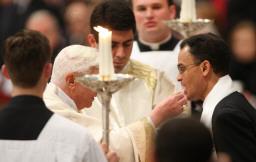A furore sparked by the pope's Easter baptism of a prominent former Muslim continued unabated on Tuesday, as the Vatican's daily weighed in, defending the move from critics.
Egyptian-born Magdi Allam, a leading Italian journalist and outspoken critic of Islamic fundamentalism, has been at the centre of a row since his conversion during a ceremony on Saturday presided over by Pope Benedict XVI.
Detractors, angry at the high-profile nature of the baptism and the pontiff's personal involvement, were further inflamed by a lengthy article Allam published the following day, suggesting that Islam was inherently violent.
The Vatican initially held back from the debate, painting the conversion as a personal matter. But as criticism continued to mount three days later, the Vatican daily l'Osservatore Romano published a commentary defending the move.
The piece by the daily's chief editor, Gian Maria Vian, said there had been ''no hostile intention'' towards Islam and emphasized the principle of religious freedom.
The commentary rejected claims the Vatican had exploited the conversion for media purposes, pointing out the baptism had been a closely guarded secret until an hour before the ceremony took place.
It also emphasized the Catholic Church's ongoing commitment to ''dialogue with the Muslim world, despite the many difficulties and obstacles''.
Yet criticism continued to flow on Tuesday.
A piece on the Hamas-owned Palestine Info website by Palestinian journalist Khalid Amayreh dismissed the idea that Allam had committed the crime of apostasy by converting from Islam to Catholicism.
But he attacked the ''purposefully high profile the Vatican gave this conversion'', stressing that ''the problem lies in the vindictive atmosphere surrounding the conversion ceremony, including the anti-Islamic allusions and insinuations''.
Junior Foreign Minister Ugo Intini, who holds the brief for the Middle East, described the affair as ''disturbing'' and urged the Church to ''distance itself'' from Allam's ''harsh attack, not on Islamic extremism, not on Islamic fundamentalism but on the entire Muslim faith''.
A Muslim theologian and professor of Islamic Studies at the Rome-based Pontifical Gregorian University, Adnane Mokrani, expressed similar concerns, agreeing that religious freedom was crucial but urging the Vatican to respond to Allam's ''latest declarations condemning Islam as a violent religion''.
Aref ali Nayed, director of the Royal Islamic Strategic Studies Centre in Amman, issued a public statement challenging the public nature of Saturday's ceremony, and suggesting that the affair ''provokes genuine questions about the motives, intentions and plans of some of the pope's advisers on Islam''.
Allam has been a figure of controversy in Italy for some years. His depiction of Islam as an aggressive religion and his support for Israel have prompted numerous death threats and resulted in an ongoing police escort.
The 55-year-old deputy editor of Italy's top daily, Il Corriere della Sera, is the country's best-known commentator on Islamic issues, although he freely admits he has never been a practising Muslim.
However, his article on Sunday contained some of bluntest criticism yet. In the piece, published as a letter to the editor in Corriere della Sera, he wrote: ''the root of evil is innate in an Islam that is physiologically violent and historically conflictual''.
The affair exploded just days after an audio tape was made public in which Al Qaeda leader Osama bin Laden accused the pope of involvement in a ''new Crusade'' against Islam.
The Vatican has been trying to patch up relations with Islam in the wake of a 2006 speech in which he quoted a 14th-century emperor who described the Prophet Mohammed's teachings as violent, ''evil and inhuman''.
Benedict, whose lecture was not about Islam but the importance attached in the West to 'reason', stressed that the text did not reflect his own opinion and later said he regretted any offence the speech may have caused.













